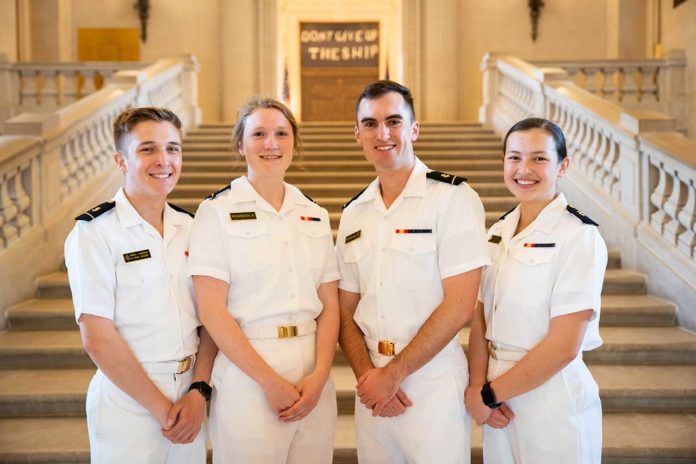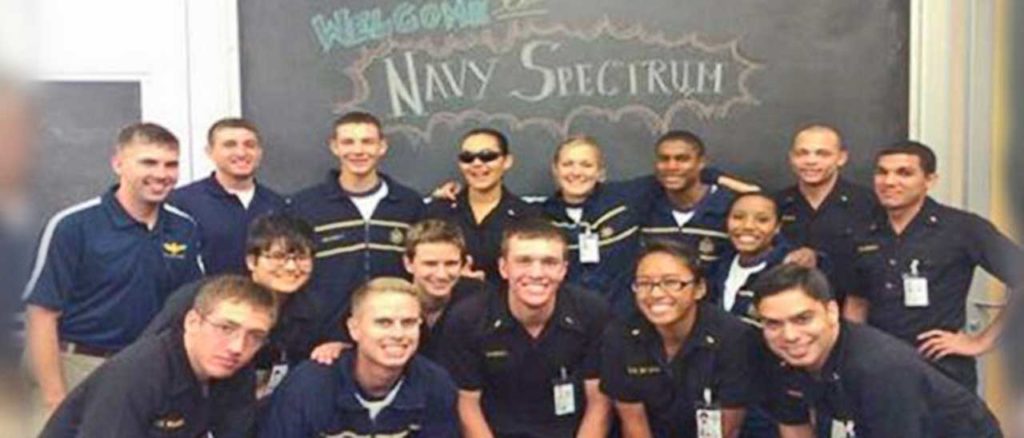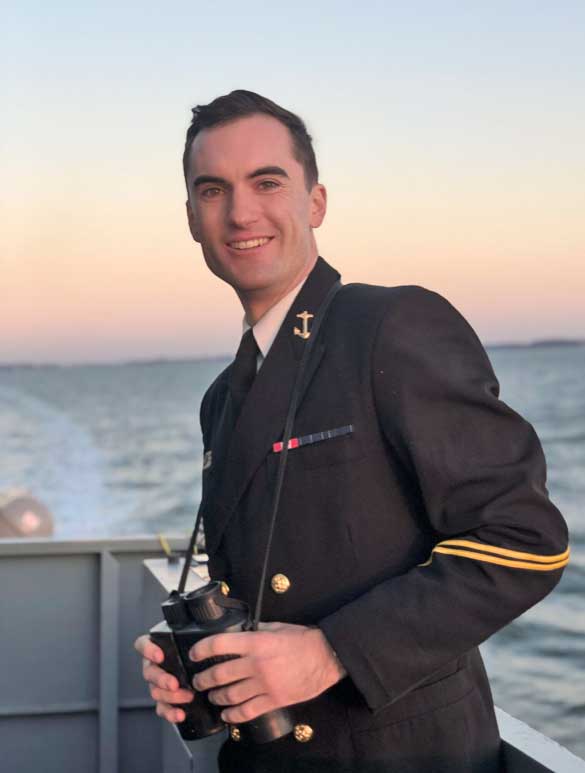
This year, like the celebrations in New York, Philly and around the world, the pride parade in Annapolis, Maryland has gone virtual. There won’t be rainbow-decked floats cruising down West Street; there won’t be queer people of all races cheering together; there won’t be contingents from Free Mom Hugs or Annapolis High School or the Naptown Brass Band. All of that will have to wait until next year.
Another group that will look forward to next year’s parade is Navy Spectrum, the Gender and Sexualities Alliance Club at the U.S. Naval Academy. As students of one of the five service academies, midshipmen at USNA become military officers upon graduation and must serve for at least five years in active duty to repay the cost of their education. Up until the 2011 repeal of Don’t Ask, Don’t Tell, being an openly LGBTQ student at a service academy was virtually impossible. Just as it was for military officers, midshipmen had often been kicked out because of their sexuality, sometimes mere months away from graduation. But now, times have changed.

Navy Spectrum was founded in 2011 and has approximately 180 midshipmen members, including lesbian, gay, bisexual and transgender members as well as straight allies. Its primary mission is to ensure that the school is safe and accepting for all people no matter their sexual orientation or gender identity. That includes working to ensure all staff and students are educated about the LGBTQ community as well as working to prevent defamation and harassment. The club puts on a variety of events including LGBTQ support groups, panels with transgender service members, film screenings, and presentations on LGBTQ topics. And for those who may need guidance in navigating LGBTQ life at the Academy, the club also has a mentorship program that pairs midshipmen with out alumni.
Midshipman second class Lorne Beerman is the President of Navy Spectrum. I interviewed him via email about his experiences leading the club, the realities of being LGBTQ at the Naval Academy, and what he would say to prospective students.

Can you give me a sense of how it feels to be an openly LGBTQ midshipmen today? Are out midshipmen generally accepted by the rest of the student body?
I feel relaxed and open to be myself as a cisgender-gay man in class, in our dorm and in my sports and clubs. I feel comfort in knowing that if any other midshipman were to verbally harass me (which no one has done to my face at least), then my classmates and the Academy body would do everything in their power to defend me. Out LGBTQ midshipmen are definitely accepted and protected from homophobic and transphobic acts. Although protected by law, some LGBTQ midshipmen who are not very outgoing about their sexuality may find it difficult to come out when they hear an occasional homophobic remark from their classmates.
My transgender classmates, who were, fortunately, “grandfathered” in before the transgender ban, are some of the most active Academy participants I know and are part of a multitude of clubs with solid friend groups. That being said, feelings of “otherness” can creep up on them, for example, during Gender Studies class when discussing the transgender military ban or the bathroom ban. When that happens, they can suddenly feel conspicuous and notice some of their classmates talk slowly and carefully like they’re walking on eggshells. The discomfort passes, and they’re free to come to a Navy Spectrum Club meeting to share their experiences and receive support.
How do you feel about leading Navy Spectrum and doing the work you’re doing in providing support to other LGBTQ midshipmen?
Spectrum’s staff members and I plan and run meetings and events as a group, and we’re all excited to help classmates who don’t have support at home or weren’t educated about what it means to be a member of the LGBTQ community. We’re excited for them to come to a meeting and relax, ask questions, ask for support and feel comfort in knowing that there are plenty of us like them who share similar experiences. Personally, I’m glad I found a group where I can discuss “Rupaul’s Drag Race” without people thinking it’s about cars (I’m Team Heidi, by the way!).
Has the atmosphere for LGBTQ midshipmen changed in the time that you’ve been there? Was anything different from the past couple years to now?
When I first started attending Spectrum meetings at the end of my plebe (freshman) year, the LGBTQ community of midshipmen seemed more self-contained, but I think over time, more people felt comfortable bringing their friends and widening the circle. More people have brought their straight ally friends in to learn from our discussions about LGBTQ history and common misconceptions and biases existing both from within and outside of our community. Some of my friends who have come from conservative or religious backgrounds with few LGBT people have told me they’ve never known a gay person before. We remained friends, and over time, they’ve become great allies.
Navy Spectrum’s function as a safe space was redefined to not only be a place that protects LGBTQ classmates but also allows anyone to ask any questions they want without fear of judgment or repercussions. We’re all here to learn from one another. And homophobic comments are still heard every once in a while, though never a direct attack, and they are much more behind closed doors than in the open.
What are your goals for Navy Spectrum and for LGBTQ midshipman in the future?
Our goal for Navy Spectrum is to widen our community outreach with even more local LGBTQ clubs and youth programs at local schools. We look forward to participating in the annual Annapolis Pride festivities, most likely next year now. We also want to host more panels hosted by transgender military members to help other military members learn more about transgender people and recognize what they have accomplished in the past and can accomplish in the future.
When I applied to college 20 years ago, I was interested in the Naval Academy but didn’t apply because I knew I was gay. Today, the reality is obviously different. What would you say to prospective Naval Academy applicants who are LGBTQ? Would you encourage them to apply?
I would tell them they don’t have to be afraid of being open about who they are with their classmates. As with any larger group of people, there will be some people who are homophobic, but there are also a greater number of allies. Luckily, the culture of today is shifting more toward acceptance, and the military in particular has laws against discrimination. Most people are willing to stand up against bullies and can report to officers who, by law, have to defend our equality. Any new incoming plebes will be lambasted much more for not having seen “Top Gun” than for being gay or bisexual. They’d be treated the same as any other teammate or club member in any sport or club they wish to pursue. I would absolutely encourage them to apply if they want to pursue a career in the military because their sexuality would not hold them back from reaching their full potential.